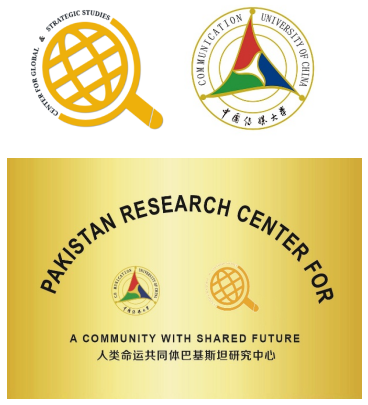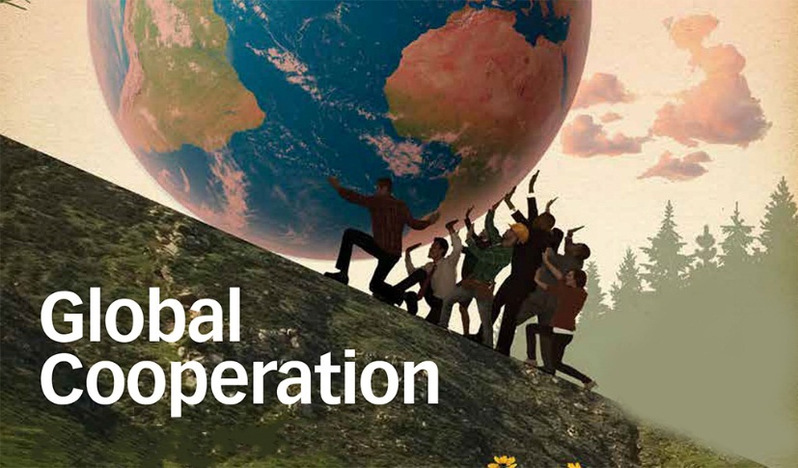

By Dr. Faheem Akhter, Assistant Professor, NED University of Engineering and Technology,
Karachi & Member Board of Experts, Center for Global & Strategic Studies (CGSS), Islamabad

Human beings cannot live in isolation as it is the law of nature. Mankind has to make a family, clan or community etc., for growth and sustainability. The aim is to have a common interest and common objective in order to get maximum benefits out of the resources. Community with a shared future is a grand narrative presented by Chinese President Xi Jinping to enhance global cooperation in evolving world. The concept is based to enhance global cooperation and reduce the common non-traditional threat faced by every state. The threat is common and self-generated by mankind thus the responsibility to resolve the issue is on the shoulders of mankind.
The Emergence of a Global Community:
Under the umbrella of a global village, social and business activities have become globalized. The local community system has its own cultural norms and values. However, globalization has impacted culture and society significantly. Resultantly, the culture and values are merging and creating new dynamics of mixed culture and traditions. The changing phenomena have also shown a significant impact on the shared community approach. Undoubtedly, Pakistan enjoys global importance due to its geographical location, having Hot Water Sea, shortest possible route to the Central Asian Republican States and further to China, Turkey, Russia and Europe. Pakistan and China are having good relations since the inception of their bilateral relationship. In this aspect, China-Pakistan Economic Corridor (CPEC) is the best evidence of the China-Pakistan partnership. The CPEC has started getting mature in the region, not only China and Pakistan but also other regional and global states are also interested in getting the benefits of CPEC. Turkey, Iran, Russia and the Central Asian States are joining CPEC to get the benefit out of the mega project. This economic shift has also increased the importance of a shared approach, where nations and states can share each other’s resources.
Emerging Non-traditional Security Threats: An Appraisal
The trend of conventional warfare has changed in the last couple of decades. States are more exposed to psychological warfare or hybrid war, which is also termed as Fifth Generation Warfare. In this kind of strategy, the opponents use multiple psychological tools to confuse the nation before and rather a direct attack on the military installations or Trans-frontier assault. Before crossing the border, the target is softened up by demoralizing the nation, dividing the population into small groups fighting each other, thus strengthen the enemy. This strategy weakens the economic and social strengthening of the nation and most of the time the inhabitants raise against their government and armed forces. In addition to the on-going menace of extremism, the emerging non-traditional security threats for the entire world is environmental protection. Countries are facing environmental threat due to industries emanating high Carbon emissions, cutting of trees for making papers and use of timber for non-productive or less productive purposes, mass urbanization or migration to big cities, thus over-burden the resources, use of plastic bags and other plastic material, throwing industrial waste into the sea or burning those and increasing air pollution. There is a long list of such unhealthy activities dangerous for plants, animals and even for humans themselves. Therefore, the grand narrative of a Community with Shared Future for Mankind by the dynamic leader, Xi Jinping provides overall solutions to these common perils.
Way Forward: Resolving Emerging Non-traditional Security Challenges with a Shared Approach

States having good relations with neighboring states, regional and global powers seem to be more secure. Thus, the best strategy to counter the non-traditional security threats is to establish diplomatic connections and communication by sharing the resources of each other. In this aspect, the following are the suggestions mentioned below:
· In the case of Pakistan, the country must embark on its existence and presence by uniqueness. Luckily, Pakistan has a myriad of things, making her important as compared to the other neighbors. The country provides the shortest supply route (access to warm water) for trade via the Arabia Sea. Thus, by engaging with regional countries many common issues can be resolved. In this aspect, projecting the idea of a Community with the Shared future would be beneficial.
· The trade can enhance vis-à-vis social-economic and cultural activities. It is also suggested to have exchange programs with neighboring states. Such programs can be for students, faculty, and professionals and even for the common citizen to understand the culture, tradition, norms, and each other’s social setup.
· CPEC is the most attractive long-term project and most projected as well. It has to be safeguarded at any cost for the prosperity and peace of not only Pakistan and China but for the entire region as well. Engaging more members/partners in this project will also help fight the non-traditional security threats.
In a nutshell, the world can fight the emerging non-traditional challenges through a shared community approach. The grand narrative of Community with a shared future can help Pakistan in enhancing its regional/global outreach and learn from the policies of other countries. These could be done in various ways mentioned below:
ØSustainable energy projects can be shifted from non-traditional fuel to wind or solar resources.
ØComprehensive Traffic policy by ensuring Vehicle fitness, controlling CO2 emissions, and introducing electronic vehicles.
ØMaking paper-free work environment by lesser paper consumption in business and institutions and gradually making it to zero.
ØTimber regulations must be strictly followed to protect illegal cutting of trees.
ØPlantation campaigns by private and public educational sectors and other institutes must be incorporated to get the desired result.
ØBiodiversity loss should be controlled and sea sewerage dumping should be minimized to protect the life at sea and shore.
ØPlastic bags and other such materials must be discouraged
ØDumping and burning waste is a great challenge for underdeveloped and developing countries. Thus, recycling waste must be encouraged for several industrial purposes.
Edited by the Institute for a Community with Shared Future, CUC
To view, kindly visit the following links:
